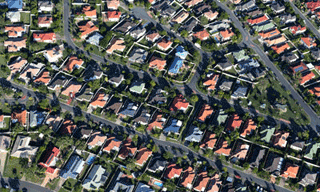Quote of the Week
“There’s a good chance we will see a deluge of people searching for properties, from those trying to get their foot in the market, to seasoned upgraders. Potential buyers could experience a shortage of listings and a spike in house values as demand outstrips supply.”
Kate Browne, personal finance expert at Finder
Regions Out-perform Capital Cities
 Property prices are rising in many parts of Australia, with the regions overall out-performing the capital cities.
Property prices are rising in many parts of Australia, with the regions overall out-performing the capital cities.
The latest data from SQM Research shows that the national average situation is a 4.0% rise in house prices in the past month and a 3.3% rise for apartments. But the capital city averages are rises of 0.6% for houses and 0.3% for apartments.
This means the bulk of the major growth is happening in regional Australia, as more and more people buy outside of the big cities as part of the dominant trend in real estate, the Exodus to Affordable Lifestyle.
The annual data also reflects this trend. The national average situation is a 7.9% rise in house prices and 6.3% rise in apartment prices. But the averages for the capital cities are a 4.3% rise for houses and a 1.8% decline for apartments.
The top cities for annual price growth are Hobart (7.6%), Melbourne (5.2%), Sydney (5.1%) and Brisbane (3.3%). Leading regional markets include the Central Coast (10%), Byron Bay (18%), Bendigo (14%), North East Victoria (12%) and the Noosa region (14%).
Loan Deferral Numbers Improve
 The steady reduction in loan deferral numbers provides further evidence of the improvement in the economy and property markets, says the Real Estate Institute of Australia.
The steady reduction in loan deferral numbers provides further evidence of the improvement in the economy and property markets, says the Real Estate Institute of Australia.
Australian Banking Association figures show the number of deferred loans has fallen below 300,000, a reduction of nearly 70% from the peak of the pandemic when more than 900,000 loans were deferred.
REIA president Adrian Kelly says the data is positive news for property markets as it signals the minimisation of forecasted financial problems.
“This is good news for those living in investment properties as it provides increased security to tenants,” he says. “It also means catastrophic forecasts for Australia’s housing market made at the start of the pandemic are simply not coming to fruition.”
Kelly says Australian Prudential Regulation Authority data shows the overall levels of household saving in Australia increased from March through to October.
Returning Expats Boost Markets
 Demographic experts say we are due for a “migration tsunami”, which will lead to extremely high housing demand.
Demographic experts say we are due for a “migration tsunami”, which will lead to extremely high housing demand.
While immigration is stagnant, the return of the Aussie expat is compensating. Returning expats can now return home even sooner under the Federal Government’s expanding quarantine processing in Darwin, set to process around 1,000 expats a month.
Over 480,000 Australians have already returned home in the past year, mostly due to the pandemic – and the Department of Foreign Affairs has revealed another 36,000 Australians have registered interest in coming home.
This is an unprecedented spike in returning expats. According to the ABS, the 2018-2019 financial year saw Australia’s population increase by 239,600 people due to net overseas migration. The amount of returning expats has already exceeded this.
Experts predict millions of prospective future Aussies are ‘waiting in the wings’ to relocate here as soon as possible – seeking to flee countries that have escalating health or political risks.
Millions Plan To Buy in 2021
 House hunting has hit “fever pitch” in Australia amid a remote working revolution, according to research by comparison website Finder. Its survey reveals that 1 in 5 are looking to purchase a property in the next 12 months. That’s equivalent to 3.8 million people planning to buy real estate in the near future.
House hunting has hit “fever pitch” in Australia amid a remote working revolution, according to research by comparison website Finder. Its survey reveals that 1 in 5 are looking to purchase a property in the next 12 months. That’s equivalent to 3.8 million people planning to buy real estate in the near future.
CoreLogic data shows that regional property values are continuously outperforming those in capital cities, as an increasing number of city slickers seek out a “tree change” while working from home.
Kate Browne, personal finance expert at Finder, says the results indicate that a post-pandemic housing boom is on the horizon.
“There’s a good chance we will see a deluge of people searching for properties, from those trying to get their foot in the market, to seasoned upgraders,” she says. “Potential buyers could experience a shortage of listings and a spike in house values as demand outstrips supply.”
Finder’s research found that more males (23%) than females (17%) have their sights set on buying property. Around a third of millennials (32%) are hoping to enter the market.
Developer Sees Benefits In Exodus
 The country’s largest listed residential developer says property markets and the economy will benefit from the exodus from central city areas.
The country’s largest listed residential developer says property markets and the economy will benefit from the exodus from central city areas.
Stockland chief executive Mark Steinert believes there is a longer-term shift to suburbia under way, benefiting the land estates the company sells and the entire metropolitan economy, which he predicts will rise on the back of a move away from the central city.
Steinert believes the pandemic has wrought more permanent changes to economic activity, with three day in-office working weeks and a greater focus on lifestyle-driving changes in the way cities operate. “People don’t expect to work in the office every day in the future,” he says. “Most people expect to have probably three days a week in an office and then deep individual work probably done at home or in a third space.”
He predicts a transfer of economic activity from the CBDs even as they make a steep recovery. “A lot of it’s going to come back but at least 10% to 20% will stay in the metropolitan area.”




